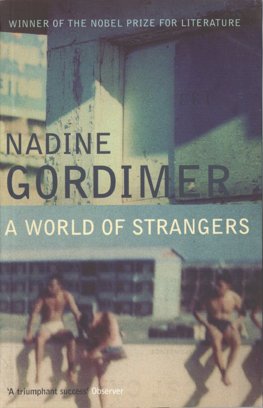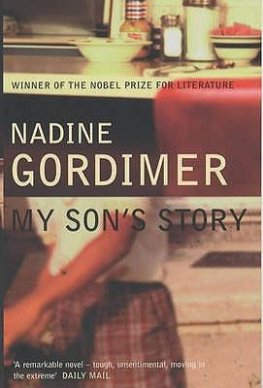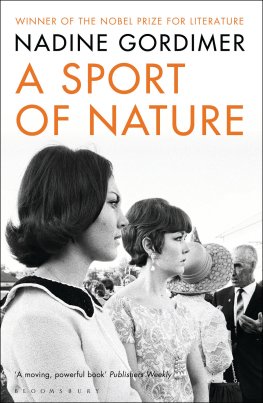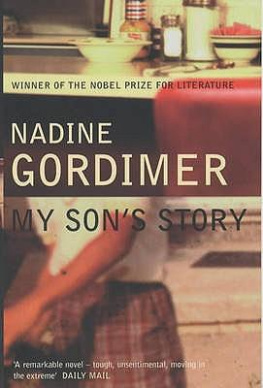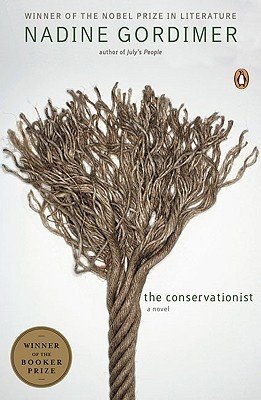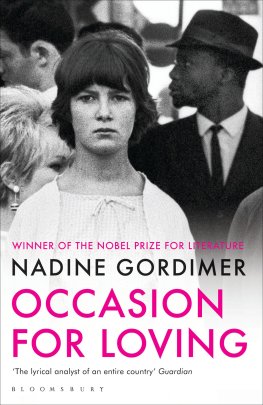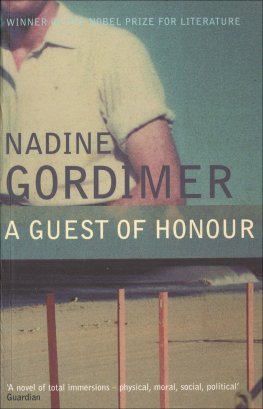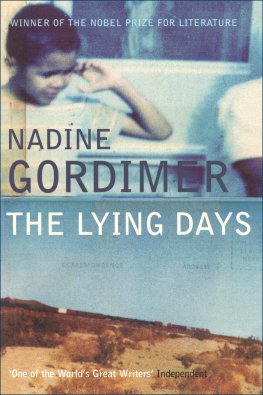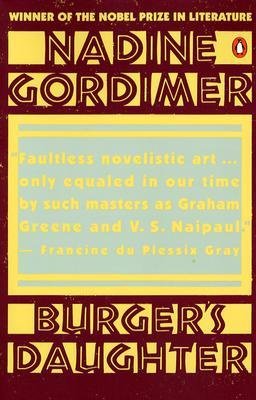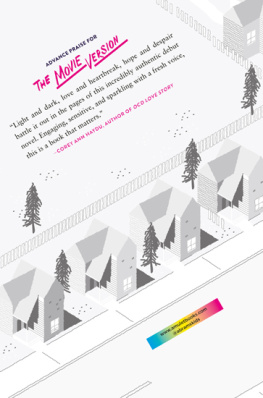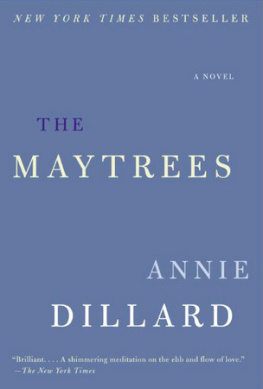Nadine Gordimer
A World of Strangers
I want the strong air of the most profound night to remove flowers and letters from the arch where you sleep, and a black boy to announce to the gold-minded whites the arrival of the reign of the ear of corn.
FEDERICO GARCA LORCA
I hate the faces of peasants.
I thought that the day the ship anchored at Mombasa, and I saw the Africans for the first time. The whole quayside was alive with them, their faces turned up momentarily from labour as we came in. In the quiet that followed the cessation of the ships engines, I saw them clearly. Heavy, mild, and brutish faces, on which emotion settles momentarily, from the outside, like a fly on the face of an ox, and is flicked away as a fly is flicked away, by an involuntary twitch that is nothing more conscious than the reaction of a muscle. I hated them in England, those faces in country lanes, red and smiling at nothing. These down among the crates on the quay shone black instead of red under the sweat, that was all, and the bloodshot eyes were brown instead of that bright vacant blue, appropriately the colour of blankness, space.
What happens to faces like these if, finally, goaded and pricked as slow beasts must be before anger rises through their turgid patience, they are roused? I could not imagine. I only knew the sharp, jowled, curved, and jutted faces of those shaped by books and doubts and ambitions, which, in anger, take on the splendid horror of Notre-Dame gargoyles. And the only Africans I had ever met with before were a few students at Oxford, and two writers and a painter in London, and they belonged in the gargoyle class, rather magnificently carved by their struggles to get there.
While I was thinking this, I was sitting in the launch that was taking us from the ship to the shore (our ship was too large to draw right into dock) beside Mrs Turgell and her daughter Rina, responding pleasantly to their exclamations at the beauty of the palm-trees. The greenness! Can you believe it? It makes you thirsty! Mrs Turgell was saying, sitting up very straight like an excited child. And for once her daughter was almost like her, twisting her long young neck this way and that, and crying Oh mummy! Do look! Exactly like something out of Somerset Maugham! said Mrs Turgell, turning to me with that mixture of gaiety and appeal you felt she so fervently wanted you to experience what she was experiencing that, however romantic and idiotic it might be, she was irresistible. Cant you imagine degenerating most marvellously in one of those thatched huts, with a beautiful native girl, a Polynesian or something, with long black hair? Mummy, you ass, said the daughter, in matter-of-fact reproach, but her mother put out her hand over mine in my lap for a moment, laughing.
Mrs Turgell did not flirt with me although she knew and I knew that I liked her better than her daughter. After all, she liked herself better than her daughter; it was one of those small tacit agreements taken for granted between us in our shipboard friendship, then about a week old. I was not quite that expression beloved of women young enough to be her son, because she was probably forty and I was twenty-six, but I was only eight years older than her daughter. I saw them both in the ships offices at Venice when we were queueing for our embarkation cards, and took a dislike to their familiar high English voices at once. By the time we touched Mombasa they were almost the only people on the ship with whom I had anything like a close acquaintance. I had made up my mind that they would not speak to anyone but the ships officers and the few Italians on whom I heard them flaunt their theatrical Italian, but Mrs Turgell slipped on to the stool beside me at the little bar before lunch one day and fell at once into her amiable chatter, apparently quite ready to overlook the fact that she had recognized me as one of the stuffy English to whom she belonged and about whom she was often amusing as well as disparaging.
We spent the day ashore in Mombasa together, Mrs Turgell, Rina, and I; or rather Stella (as Mrs Turgell insisted I call her) and I were together, alternately losing and finding Rina the way one progresses when in the company of an unleashed puppy. When we got out of the docks, I wanted to get a taxi to take us into the town, but Stella insisted that it would be more fun to walk and explore as we go. (Explore was one of the bright schoolgirl words which abounded in Stellas conversation.) We had not gone far up a wide road spattered with shade, fallen flowers, and seed-pods from brilliant trees when Rina disappeared into some sort of warehouse, her badly-fitting green slacks flapping against her long legs, her cheap sandals, bought in Port Said, with pictures of palm-trees painted on them in red and green, slapping against her thin bare feet. She wore a boys American shirt with a design of film-stars faces hanging outside the pants, and it was by this garment that her mother, charmingly dressed in some sort of full dress that showed her small pretty figure and bared the delicate flesh of her shoulders and the top of her breasts, recognized her in the gloom of the warehouse.
We went in after the girl and found some other passengers from the ship, the consul and his mother and wife, standing about and prodding at bundles of elephant tusks, tusks of all sizes, hanging from the roof and piled on the floor. With the knowledgeable eagerness with which people love to impart information of which they themselves were ignorant until a few minutes before, Rina and the rest of the little group passed on to us, interrupting and correcting each other, what the attendant of the warehouse had just told them about the prices of elephant tusks. The consul, although he had never before been stationed in Africa he was on his way to take up an appointment in the Belgian Congo murmured about the ivory market with the matter-of-fact acceptance of one accustomed to the exotic He had lived for years in the Balkans and in Turkey, I gathered. The poor little things, said Rina, sliding her sandal over the short curve of a baby elephants tusk; and I could see that she was going to be another of those English women who can love only animals: the weak, dumb, and dependent.
We all struggled out into the sun again together, an untidy group, undecided about our destination. The consuls wife said nothing but looked eloquently, and I guessed that she must have timidly expressed a wish aside to Rina in the dim warehouse, because Rina, slopping gawkily along, said, Lets find Kalindini Road. Thats the place where the shops are where you can buy topaz. Mummy, I want a big oblong topaz for my little finger. Theyre Indian jewellers, I believe, said the consuls wife, politely, as if repeating something of no interest to herself. Oh and Id like to find the sandal-makers, said Stella; and the whole sight-seeing excursion threatened to fizzle out into one of those wearisome foreign shopping expeditions where the men trail around patiently behind the women.
The consul had joined the ship at Port Said. He had all the distinguishing physical characteristics of the ideal upper-middle-class Englishman which I had not. My appearance was such a thorough debunking of the wistful popular conception of what my sort of breeding and background ought to produce that it seemed deliberate, the gleeful contrivance of bored genes; though I didnt delude myself with the consolation that by this fact I had escaped the insular Britannic stamp, prime on my rump, as it were. I have brown eyes and brown hair which is not as straight as an Anglo-Saxons should be, but my large features and too-big head set on my stocky body come straight out of Dickens and nowhere else. (Not one of Dickenss slim Copperfields, but a friend of one of the heroes, one of those staunch friends with large, intelligent dark eyes to make up for their unattractiveness, etc. This was pointed out to me at Oxford, but I confirm it for myself.) The consul was tall inevitably sharp-kneed, large-footed, and broad-shouldered, and he had a long patrician face with thick eyebrows over fine grey eyes which looked blue when he was looking at the sea or the sky. He had all his hair and it was straight and grey. He was a Celtic type and I suppose was once dark-haired. His mother was exactly like him (I let the situation rather than biological correctness decide precedent here), almost as tall, every bit as distinguished. They used each others names all the time, like people in a play: Mother, would you like your tea now? Yes, Hugh, I think so. They never called the wife anything at all: Where is she? Down in the cabin, I suppose. Sometimes when the consul was forced, as he seemed to feel himself to be, to answer for her in her presence, he referred to her as my wife, giving a curiously legal ring to the designation, as a judge might speak of the defendant or the plaintiff. For the first few days, when we were passing through the Red Sea and lived in a spell of heat anyway, as if the world had stopped turning, so that recollection of whom we saw or what we did was dreamlike, she did not appear at all, so far as I knew. Heat or seasickness must have kept her to her cabin. The consul and his mother were alone at meals, and I played bridge with them several times in the air-conditioned card-room, where we sat around numbly like so much refrigerated food, and if our hands touched accidentally, recoiled at the fish-like contact of chilled flesh.

